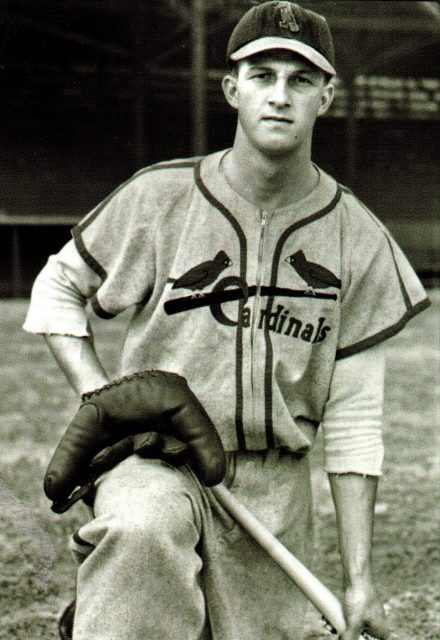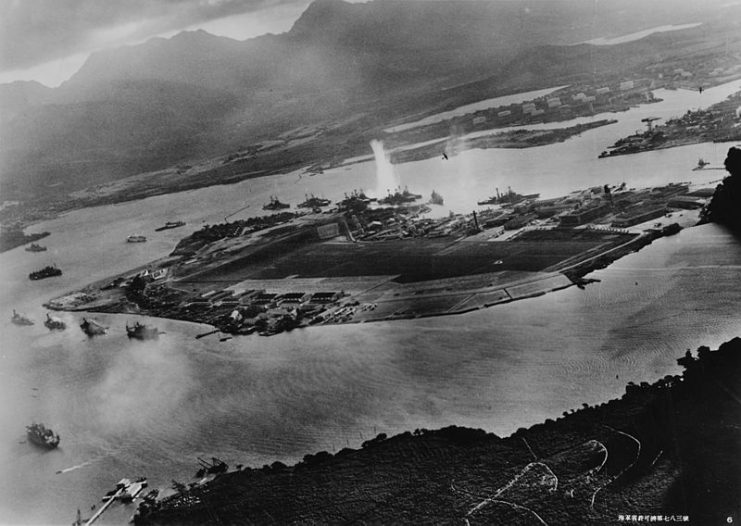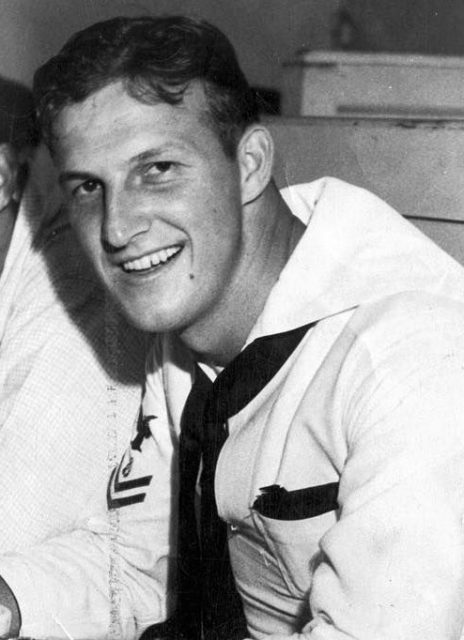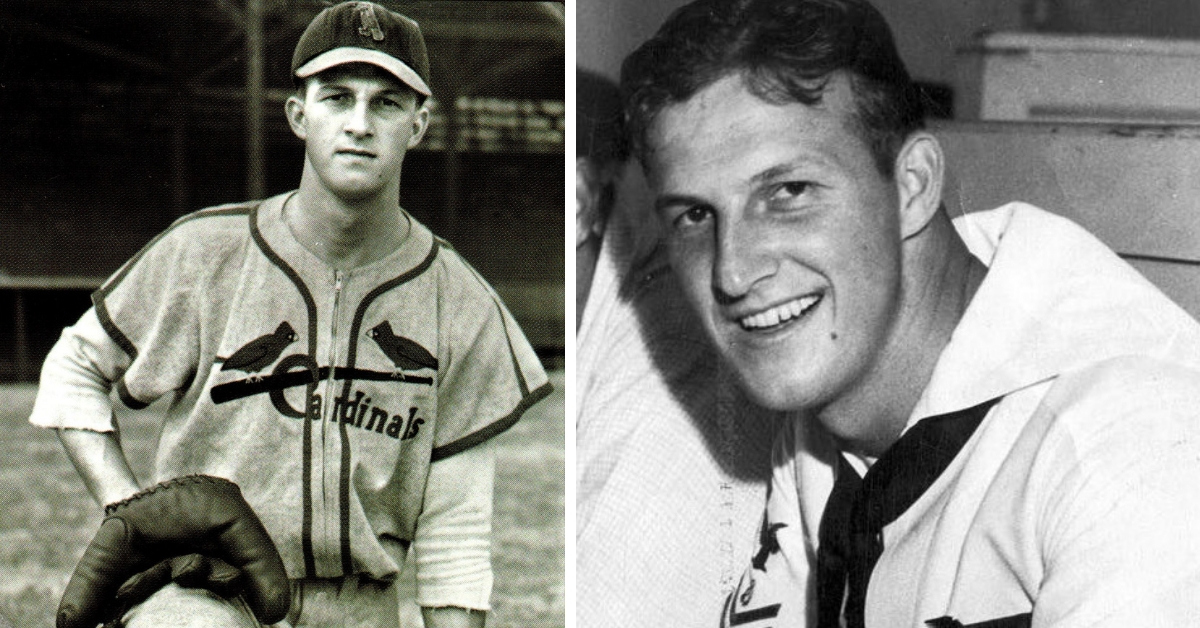The “crack” of Stan Musial’s bat produced a staggering 3,630 career hits, ranking him first in the National League when he retired from baseball in 1963, and becoming the inspiration for countless smiles among generations of St. Louis Cardinals fans. Despite the impressive statistics that serve as part of the baseball icon’s legacy, the numbers fail to reveal the dedication he demonstrated to his other team—the United States—when called to serve in World War II.
“He missed the entire 1945 baseball season because of the military,” said Brian Schwarze, Musial’s grandson. “Who knows what kind of numbers he might have put up if he had played professionally that year, but he was called to serve his country and he did his duty,” he added.
A native of Donora, Pennsylvania, Musial married the former Lillian Labash in 1940. The following year brought two major life events for “Stan the Man,” with the birth of his son, Richard, and playing his first major league game with the St. Louis Cardinals.

Regardless of any prowess demonstrated on the playing field, his draft registration card notes that the 21-year-old was required to travel to Donora, Pennsylvania, to register with his local draft board on February 16, 1942, as part of the 1940 Selective Training and Service Act.
Married with a child, in addition to providing support to an ailing parent, Musial initially received exemptions from service and continued to distinguish himself in baseball, earning the first of three National League Most Valuable Player awards in 1943.
“Stan Musial, Donora’s outstanding athlete … passed his pre-induction physical examination today and joined his teammate Danny Litwhiler in awaiting call to report for service in the Navy,” reported the Morning Herald (Uniontown, Pennsylvania) on May 17, 1944.
Continuing to play through the 1944 season, Musial explained in his 1964 self-tilted biography written by Bob Broeg, “I was really relieved to go into service when my Donora draft board finally called in January, 1945.” He added, “I chose the Navy and was sent to Bainbridge (Maryland) for basic training.”
The Leader-Telegram (Eau Claire, Wisconsin) reported on January 24, 1945, “Stan Musial, St. Louis Cardinal slugger, donned a sailors’ uniform at the Bainbridge Naval Training Center today, where he will undergo ten weeks of ‘boot’ training.” The paper further explained, “Musial told Bainbridge officials he hoped to resume his baseball career after the war.”

Assigned to Company 3023 during his recruit training, the Bainbridge Mainstreet—a newspaper printed by sailors on the base—reported on March 3, 1945, that Musial, who was the company athletic petty officer, led his sailor’s to victory in a regimental basketball competition.
During the four months he remained at the Maryland training site, he also played several baseball games for the Bainbridge Commodores. In late March 1945, the Commodores hosted a three-game series against the New York Giants that resulted in a win, loss and tie for the Navy team.
In early May 1945, Musial returned home for a few days of leave before reporting to San Francisco, from where he sailed for his next duty assignment—Pearl Harbor. Shortly after his arrival, reported the Bainbridge Mainstreet on June 2, 1945, he “chipped a bone in his hand driving for a line drive …”
He quickly healed from his injury and continued his duties of running a liberty launch for approximately four hours each morning, transporting sailors to and from ships moored in the harbor for various repairs. In the afternoons, he played baseball in the Hawaiian sun for another four hours.
“By the time I got off that thing (liberty launch), and went over to run around in more sun, I was dead,” said Musial in an interview printed in the St. Louis Post-Dispatch on February 3, 1957. “I finally told the officer in charge, ‘You gotta make a choice, I can ride around on that boat, or I can play baseball. I don’t much care which, but it’s gotta be one or the other.’”

Musial would play baseball for the remaining months of his naval service.
It was also during this time frame that the baseball pro adjusted his hitting stance so he could hit more home runs, providing additional entertainment for the service members watching the ball games. This modification would haunt many a major league pitcher in the coming years.
When his father fell deathly ill with pneumonia in the latter part of 1945, Musial’s mother made an appeal through the Red Cross for her son to be granted emergency leave. The sailor returned to the states in January 1946, and was assigned to the Philadelphia Navy Shipyard to be closer to his family. Fortunately, the elder Musial recovered.
“Two months later, when Uncle Sam suddenly began to release itchy-footed servicemen, I got unexpected good news. I would be out in time to play the 1946 season,” said Musial, as quoted in his aforementioned biography by Bob Broeg.
Receiving his discharge on March 1, 1946, after 13 months of naval service, Musial returned to his wife and son. The baseball family later welcomed the addition of three daughters—Gerry, Janet and Jean. In 1963, Musial finished his legendary playing career with the Cardinals and, in 1969, was elected to the National Baseball Hall of Fame in his first year of eligibility.
The WWII veteran and sports superstar died at his home in St. Louis County on January 19, 2013; he was 92 years old.
“He has always been known for baseball but he was more than just baseball,” said Brian Schwarze, when describing his late grandfather. “Don’t get me wrong, he loved baseball but he was very charitable and, because of his experience, always liked to support three groups of individuals—firefighters, police and veterans.”
Schwarze added, “But few people know about his Navy service because it was brief and he would often downplay what he did by making the joke that he ‘served with the hula girls.’ Regardless, he did not run from his responsibility and answered the call in time of war.”
Another Article From Us: The Follow-Up to ‘Band of Brothers’ is Coming
“His military story is something different than his baseball career and he was proud that he had been given the opportunity to serve his country.”
Jeremy P. Amick writes on behalf of the Silver Star Families of America
